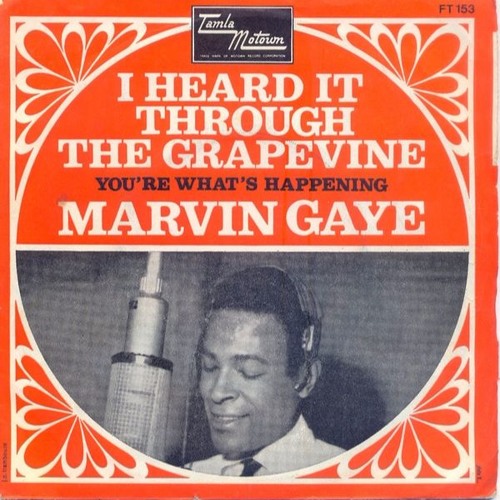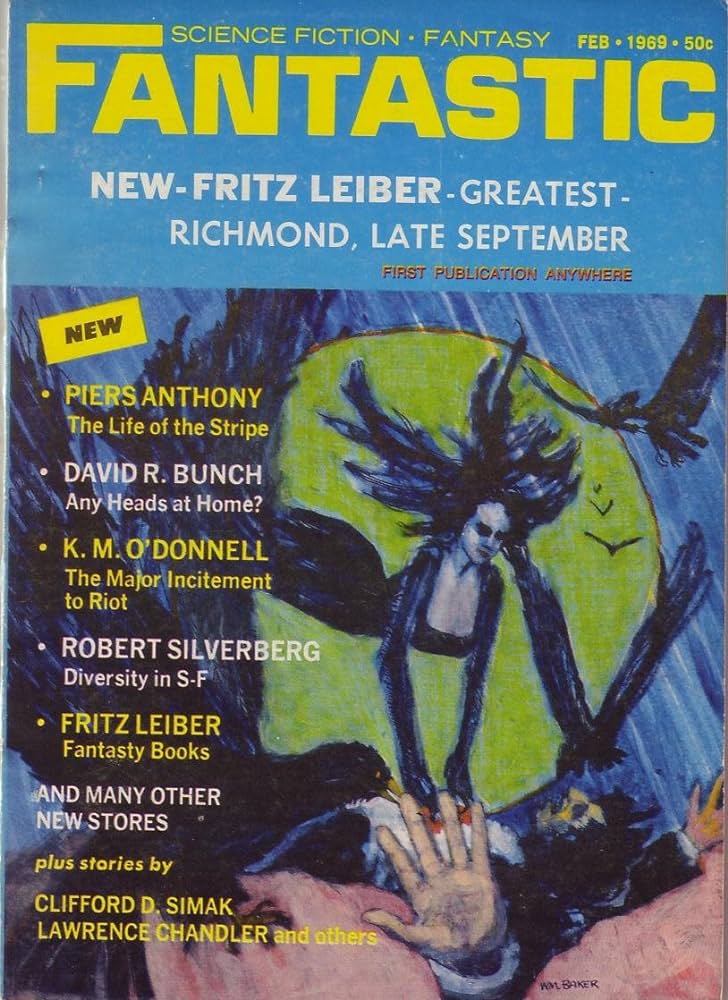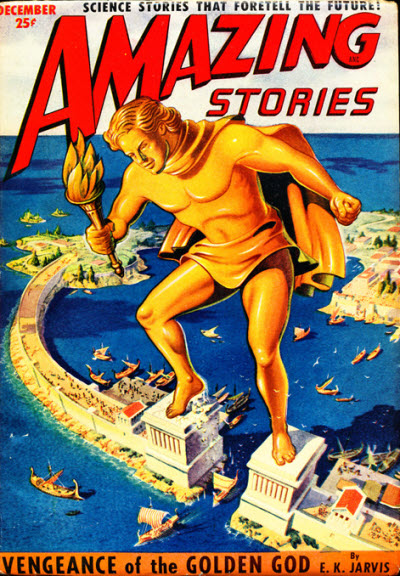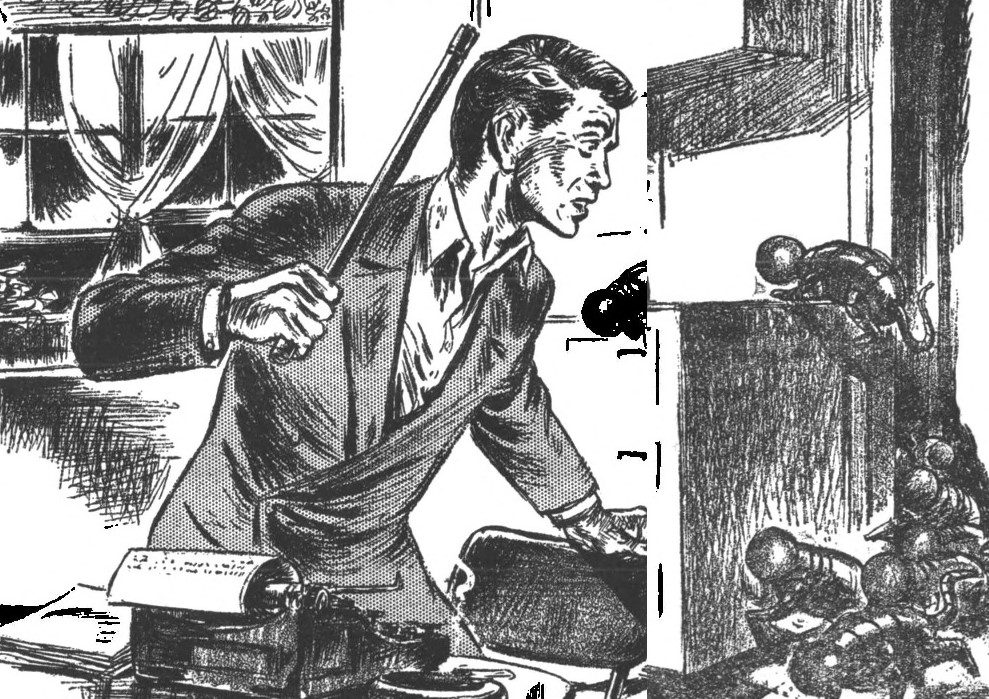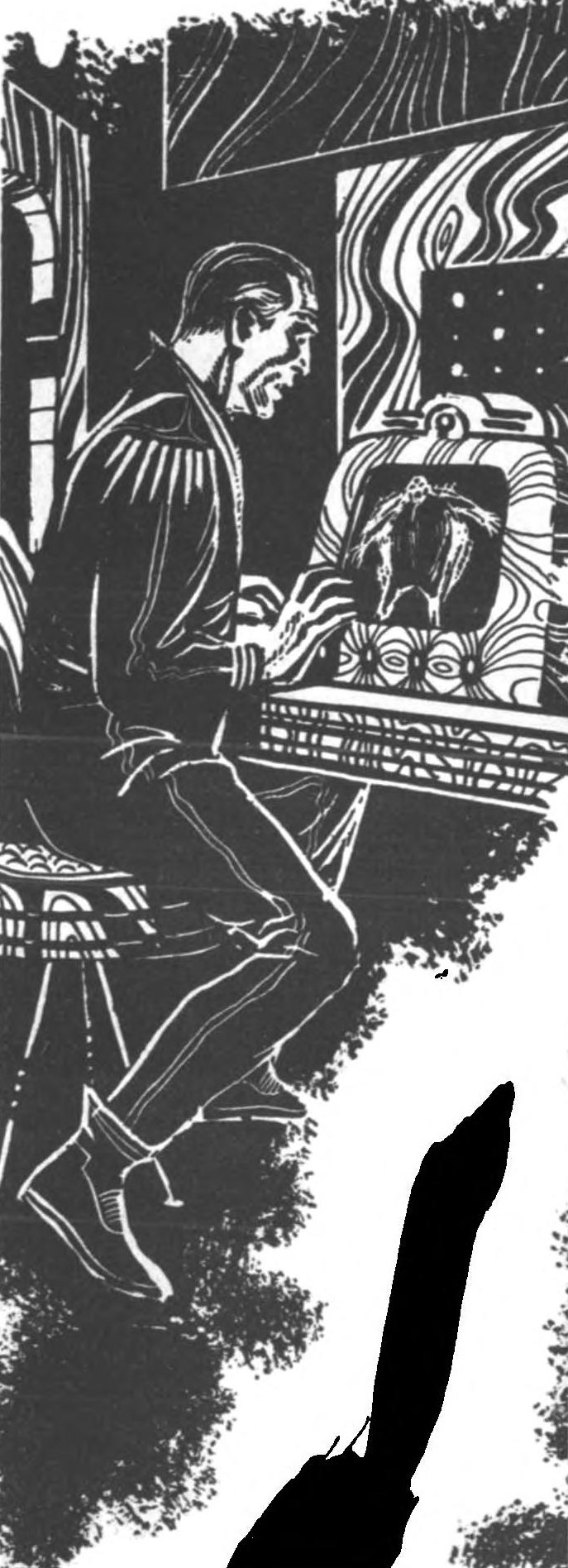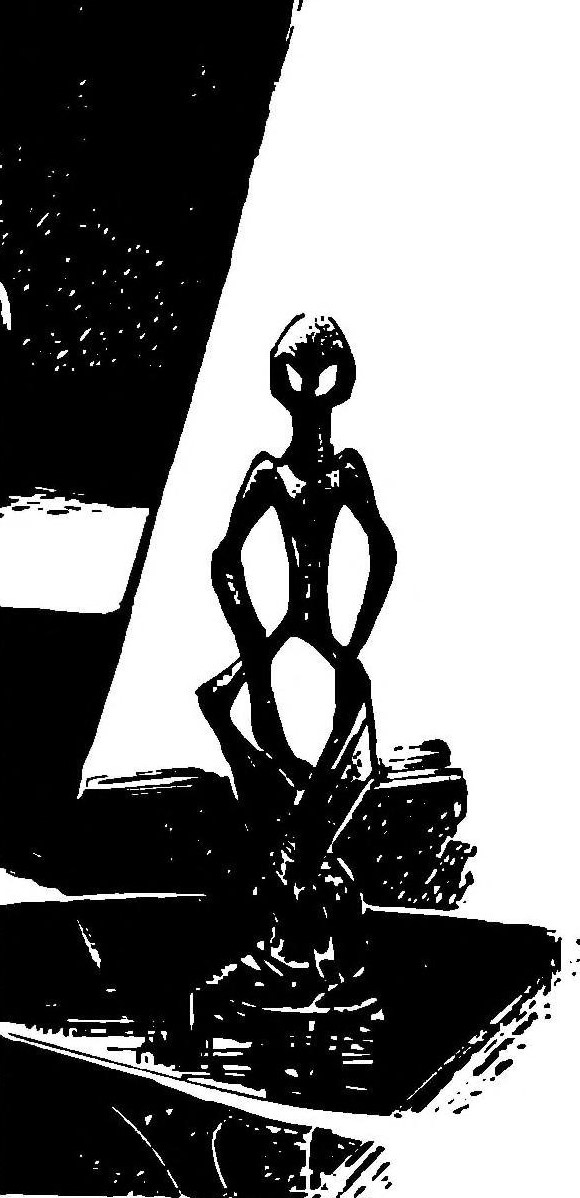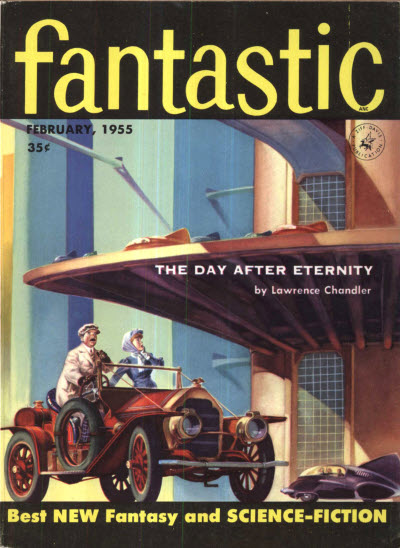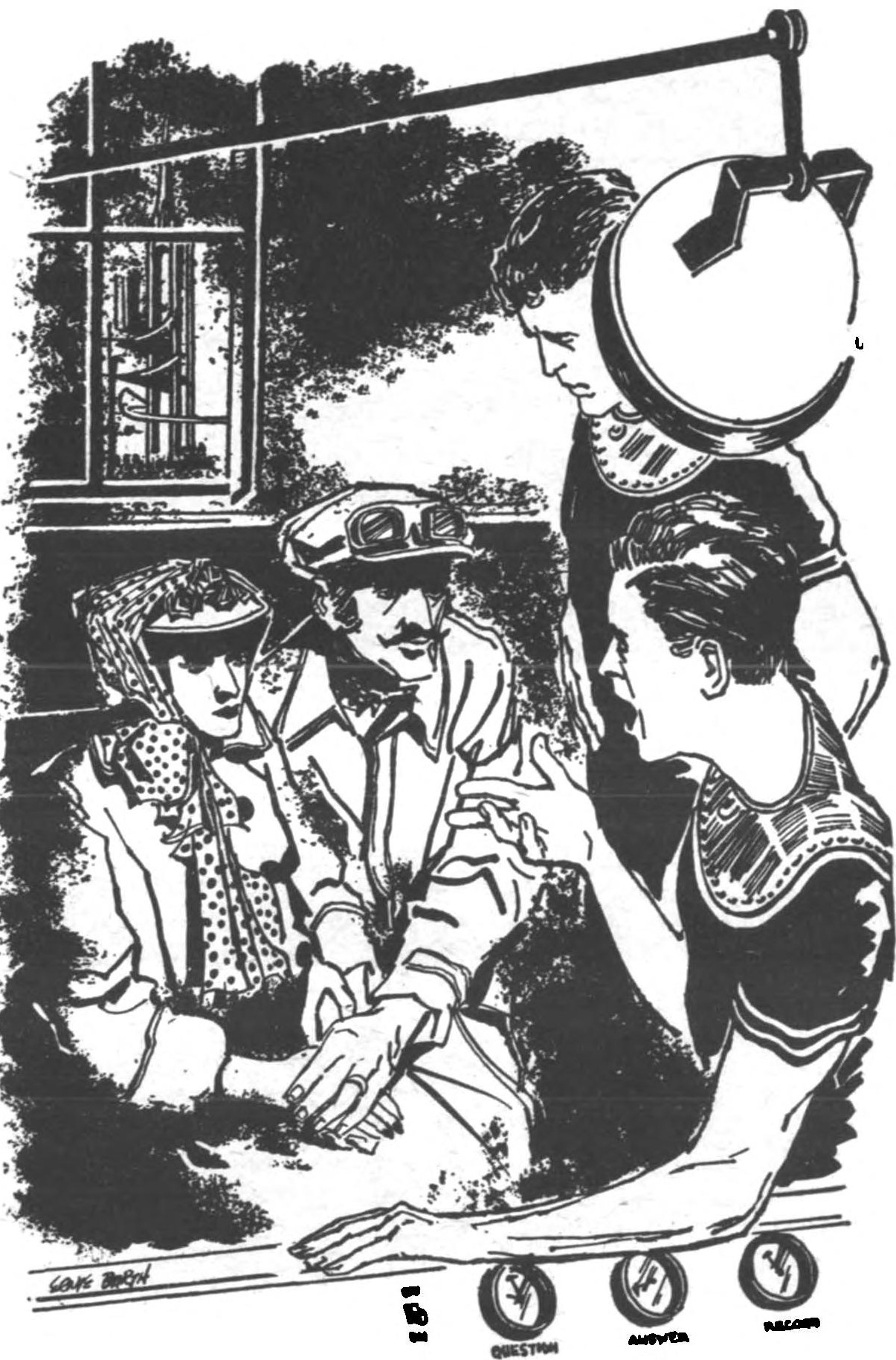
by Gideon Marcus
On to Mars!

Four years ago (has it been that long?) Mariner 4 became the first space probe to sail by Mars. This event instantly destroyed a thousand dreams. The 21 grainy, black and white pictures returned by the spacecraft's TV cameras showed a cratered, lunar-type surface. The Martian atmosphere was found to be less than 1% as dense at the surface as that of Earth. Gone was the romantic Mars of Edgar Rice Burroughs and Leigh Brackett.
These findings should not have come as such a surprise—the abundance of craters and the thin atmosphere had already been suspected before Mariner 4 ever got there. But the photographic evidence was the final nail in the coffin. Mars is dead.
Or is it?
Mariner 4 was a rather limited spacecraft. We only got 21 pictures, after all. And while 7 millibars may not seem like much, that's a veritable atmospheric blanket compared to the Moon or Mercury. We need more data.
This is why a second generation of spacecraft, Mariners 6 and 7, are being sent to Mars. These are heavier spacecraft with more sophisticated equipment: infrared and ultraviolet radiometers (measuring Martian energy output in those wavelengths), a better TV camera, and the ability to reprogram the spacecraft in flight, as needed.

Mariner 6 took off last week on the 24th, and Mariner 7 will blast off March 21st. We've yet to have both members of a Mariner pair make it to its destination (Mariner 1 and Mariner 3 both had mishaps), but hope springs eternal. Come this summer, perhaps around the same time a man sets foot on the Moon, we will unveil more mysteries of the fourth planet.
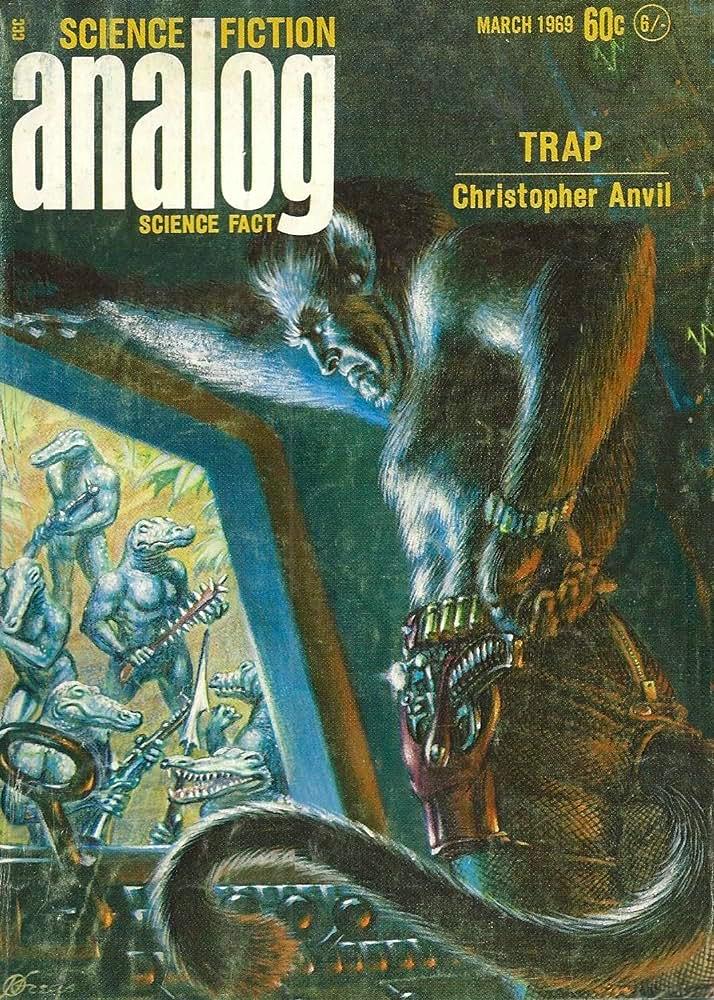
by Kelly Freas
On to the stars!
Trap, by Christopher Anvil

by Kelly Freas
I have a private joke that every Chris Anvil story for Analog begins (Mad Lib style):
[Military Rank] [WASPy male name] of [military organization] [verbed] down the [corridor/hall/base] lightly touching his [weapon] clipped to his [clippable article of clothing].
"Trap" did nothing but reinforce this cliché, and I hunkered down for a slog of a novella.
Instead, I got a reasonably interesting, technical tale about peaceably dealing with implacable aliens, who possess an unbeatable weapon. In this case, the planet is a swampy wasteland, the aliens have the ability to teleport anywhere they've been before, and the humans and Centrans (in an alliance since the 1956 story, "Paradise Planet") must find a way to make peace before the aliens find a way to teleport onto every ship and planet in both empires.
It starts a bit slow, but I found myself compelled. Certainly better than the fare Anvil usually offers us in Analog. Three stars.
Mirror, Mirror, on the Wall, by R. E. Allen
How does Mannie supply all the movies and music producers with the top talent? Why, by dowsing over each of the actor's/musician's headshots with a divining rod, of course!
Not much of a story. Not much science fiction. Two stars.
They're Trying to Tell Us Something (part 1 of 2), by Thomas R. McDonough

This month's science article is on those enigmatic, recently discovered interstellar radio beacons known as pulsars. Beeping on the radio dial on the average of once a second (some are faster, some are slower), they are significant for their unwaveringly precise timing and for their enormous power output—some one billion times the power output of all of Earth's civilizations!
There is a lot of interesting information in this article, but what annoys me is that McDonough seems convinced that pulsars are the work of "Little Green Men" (LGM), and presents his article accordingly. Nowhere in the piece is the general accepted wisdom that the regularity of the signals and the fact that they seem to carry no information (not to mention their tremendous power) indicates that pulsars are rapidly rotating stars, and likely rapidly rotating, collapsed dead stars called "neutron stars".
This isn't esoteric knowledge I gleaned from The Astrophysical Journal—it's from the Sunday Supplement of Escondido's rag of a paper, The Times-Advocate. So, its exclusion from McDonough's piece must be conscious, and that makes his arguments suspect. Perhaps he'll discuss neutron stars in the next piece, but they really should have been front and center.
Three stars.
Minitalent, by Tak Hallus
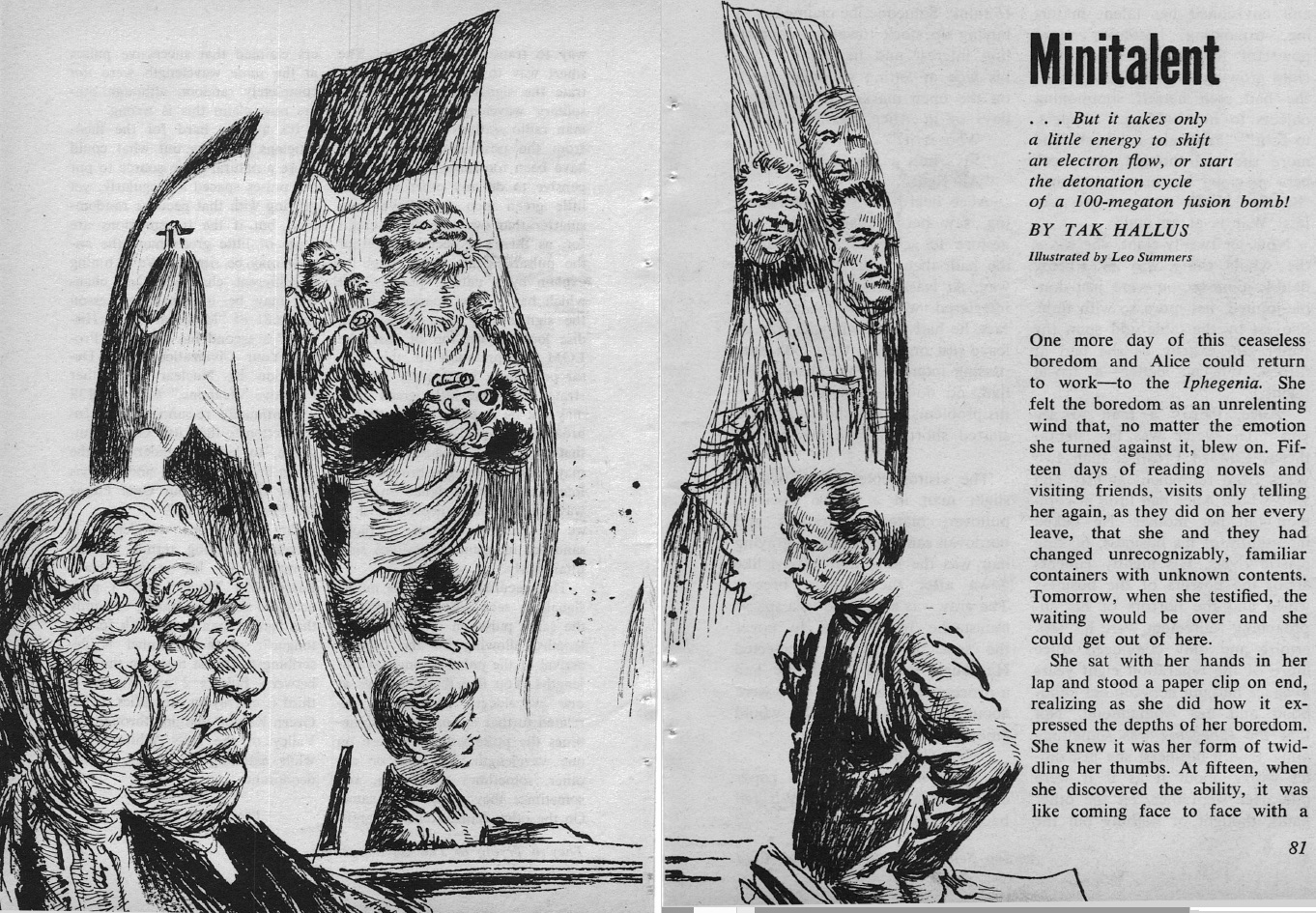
by Leo Summers
Alice Culligan, third mate and computer officer on the space ship Iphigenia, witnessed a crime: gun runners had smuggled cruel "nervers" to a race of aborigines. They were caught, but the company they're working for looks to get away scott free. They will do anything to ensure that verdict—including silencing Miss Culligan forever.
But Alice has an ace up her sleeve: a minor talent for telekinetics. And in a computerized world, sometimes a little push is all that's needed…
Similarly premised as Larry Niven's sublime "The Organleggers", this tale (Tak Hallus' first) is not as deftly told. That said, it is pretty good, and I liked the heroine very much. It's clearly in the vein of, say, James H. Schmitz, so if you like him, you'll like this.
By the way, Tak Hallus is simply Arabic for "pseudonym", so who knows? Maybe it really is Schmitz!
Four stars.
From Fanaticism, or for Reward, by Harry Harrison
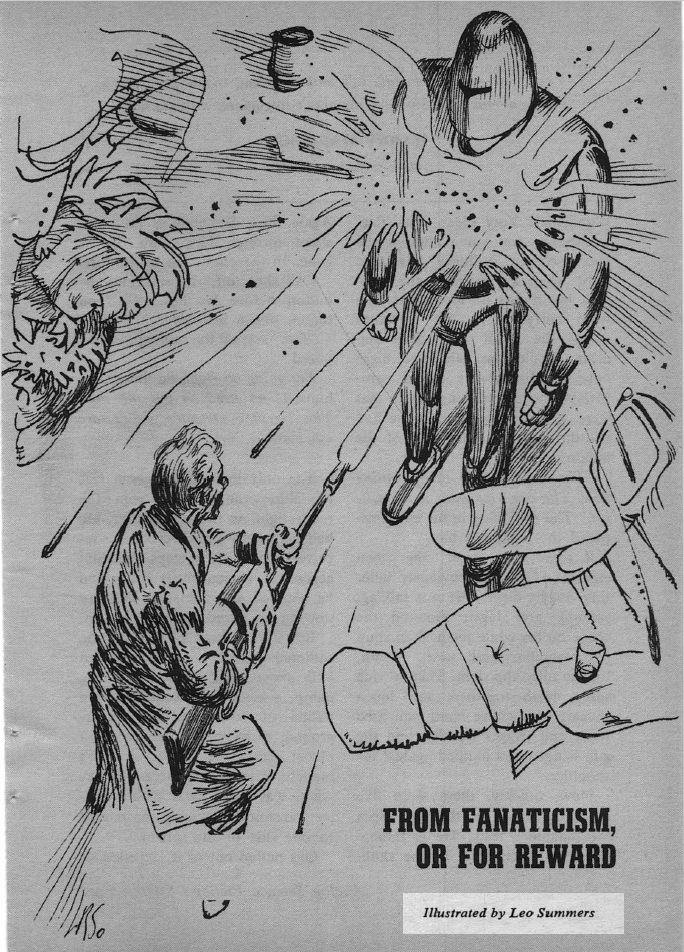
by Leo Summers
An assassin named Jagen performs a job and, with the help of a teleportation system, escapes The Great Despot's justice. But is there any ultimate evasion the efficient robot machines of the Despot's police force?
The well-written piece is really a setup for the philosophical question posed at the end. The answer is surprising for such a libertarian mag as editor Campbell's.
Five stars.
Wolfling (Part 3 of 3), by Gordon R. Dickson
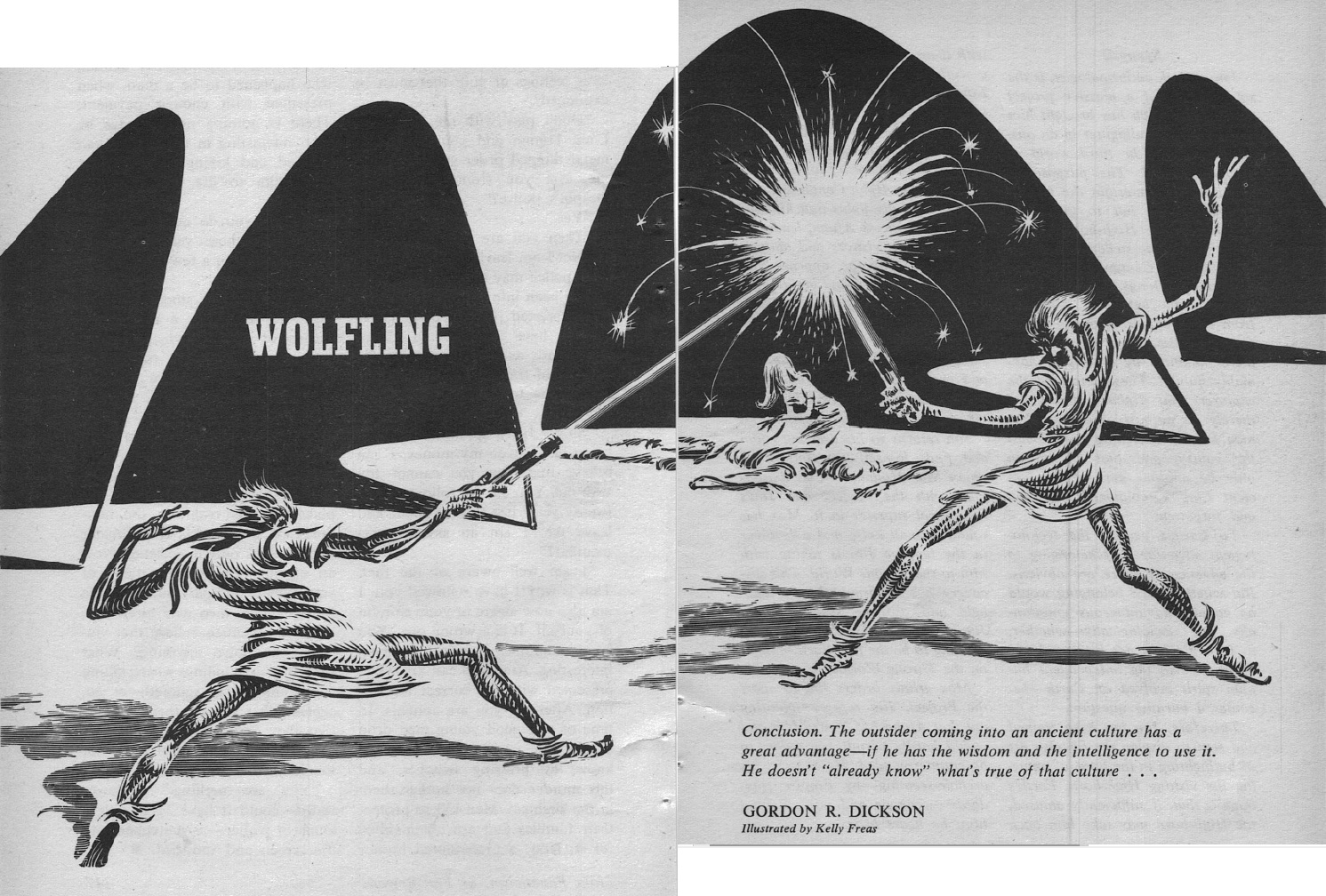
by Kelly Freas
And now, the conclusion of Wolfling. By Gordy Dickson.
Jim Weil, archaeologist and Ace of All Trades (the term "bannou" (万能) is even more appropriate), had infiltrated the High-Born empire he was sent to detachedly examine, becoming a general in its armies. Having discovered a plot to destroy the imperial warrior race of Starkiens, Jim quickly returned to the throne world to thwart a plot on the Emperor, himself. He is successful in defeating the pretender, the Emperor's cousin, but now he must return to Earth and face treason charges for possibly incurring the imperial wrath on humanity.
In a dramatic courtroom scene, Jim explains his actions, how they saved the Earth, and the true origin of humanity vis. a vis. the High-Born. Did we come from them, or did they come from us?
The answer is rather disappointing, more along the lines of something I'd expect written in the pulp era than modern times. In addition, all of the energy-saber dueling seemed unnecessary; when everyone can teleport at whim, how do you keep your foe in the same room long enough to dispatch him? Or keep your foe from materializing behind you?
But most of all, I had expected a statement against eugenics, but instead got something of a defense of it. If not for the skilled writing, I might rate it more poorly.
Three stars for the serial as a whole.
On to the numbers!

You know, it's been quite a month! With Analog clocking in at 3.4 stars, it's near the top of the heap rather than taking its usual place in the middle. Ahead of it were Fantasy and Science Fiction (3.4) and IF (3.5). The good news is, the spread was pretty narrow: Galaxy scored 3.3, New Worlds 3.2, New Writings 14 3. Only Amazing scored below the three-line (2.7), and it was still better than usual.
In other vital statistics, women produced 11% of the new fictional content. The superior stuff this month would fill three full-sized magazines. Given that there were seven published this month, that's a good ratio.
Stay tuned for the end of next month when we find out how April's magazines do…and how Mariner 7 flies!

![[March 1, 1969] Beyond this Horizon (March 1969 <i>Analog</i> and Mariner 6)](https://galacticjourney.org/wp-content/uploads/2024/02/690301cover-672x372.jpg)


![February 26, 1969] Springtime for Moorcock? <i>New Worlds</i>, March 1969](https://galacticjourney.org/wp-content/uploads/2024/02/NW-March-1969-672x372.png)


 Cover by Gabi Nasemann. Is this Moorcock horrified by his announcement?
Cover by Gabi Nasemann. Is this Moorcock horrified by his announcement?  Artwork by Mal Dean.
Artwork by Mal Dean.
 The magazine’s obsession with D.M. Thomas continues, with something given under the premise that it is a transcript of speech from Mr. Black, a schizophrenic, as he is treated. As the story progresses, in
The magazine’s obsession with D.M. Thomas continues, with something given under the premise that it is a transcript of speech from Mr. Black, a schizophrenic, as he is treated. As the story progresses, in 
 Bizarre artwork by Mal Dean, seemingly stuck in at random in the middle of this story.
Bizarre artwork by Mal Dean, seemingly stuck in at random in the middle of this story. Artwork by Mal Dean.
Artwork by Mal Dean. Continuing the war theme, now with poetry, this time from writer and reviewer MacBeth. His last prose piece was in July 1967. The Hiroshima Dream touches on themes that seem very Ballardian, so it seems a logical piece to follow Ballard. Death, destruction, dystopia….fifty tankas* all based around apocalypse and the nuclear bomb dropping at Hiroshima. Although it is shockingly dark, I prefer MacBeth to D. M. Thomas. 4 out of 5.
Continuing the war theme, now with poetry, this time from writer and reviewer MacBeth. His last prose piece was in July 1967. The Hiroshima Dream touches on themes that seem very Ballardian, so it seems a logical piece to follow Ballard. Death, destruction, dystopia….fifty tankas* all based around apocalypse and the nuclear bomb dropping at Hiroshima. Although it is shockingly dark, I prefer MacBeth to D. M. Thomas. 4 out of 5.


![[February 22, 1969] Good and Bad Trips (March 1969 <i>Fantasy and Science Fiction</i>)](https://galacticjourney.org/wp-content/uploads/2024/02/690222cover-665x372.jpg)


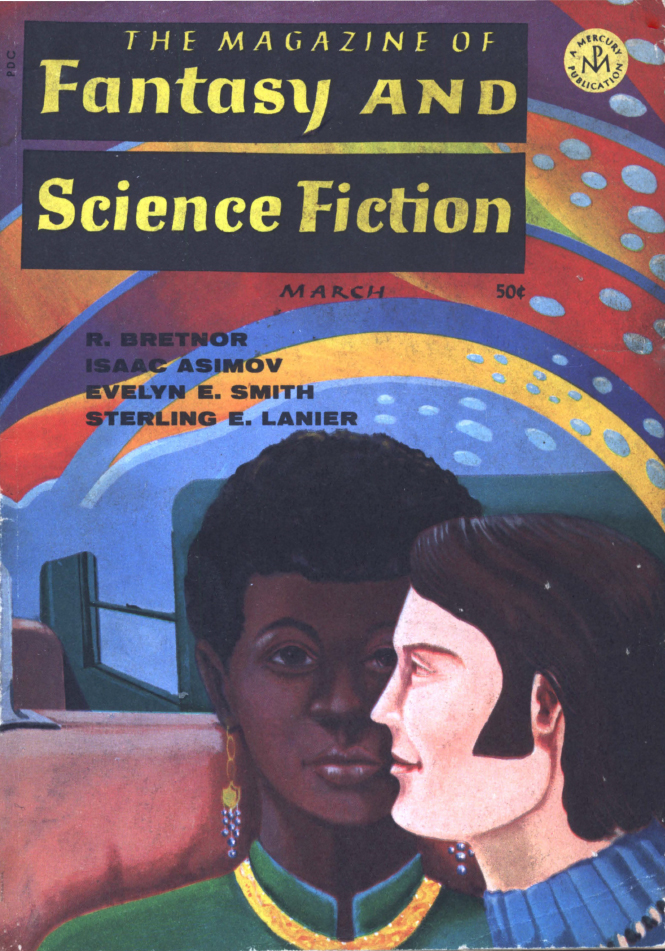
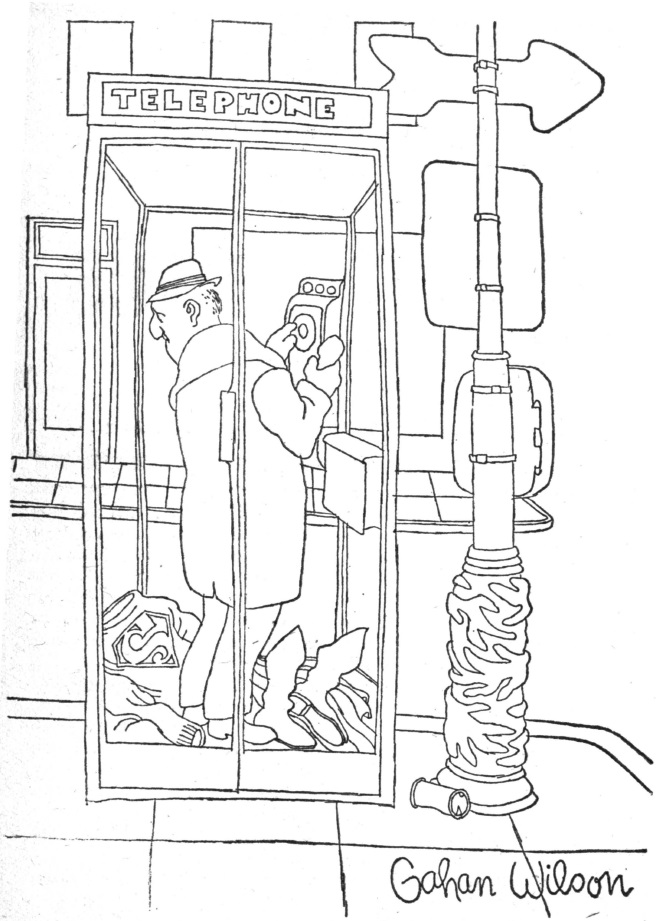

![[February 12, 1969] Slick stuff (March 1969 <i>Galaxy</i> science fiction)](https://galacticjourney.org/wp-content/uploads/2024/02/690212cover-662x372.jpg)



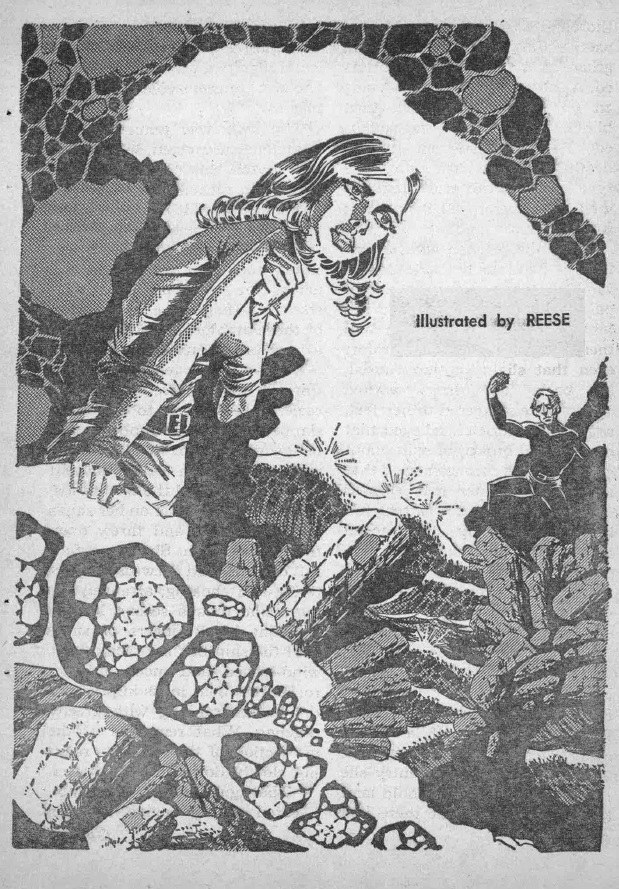



![[February 8, 1969] So Much for That (March 1969 <i>Amazing</i>)](https://galacticjourney.org/wp-content/uploads/2024/02/amz-0369-cover-492x372.png)







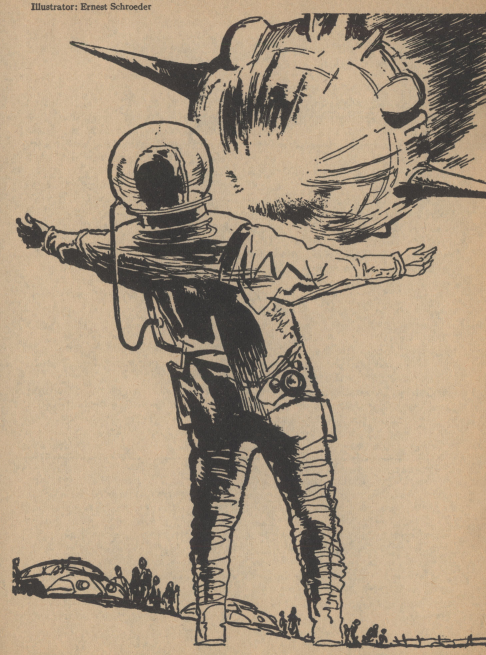
![[February 2, 1969] Winners and Losers (March 1969 <i>IF</i>)](https://galacticjourney.org/wp-content/uploads/2024/01/IF-1969-03-Cover-574x372.jpg)

 Counter-protesters armed with sticks and iron bars attack civil rights marchers while the police look on
Counter-protesters armed with sticks and iron bars attack civil rights marchers while the police look on The Steel General rides again. Art by Best Professional Artist Jack Gaughan
The Steel General rides again. Art by Best Professional Artist Jack Gaughan![[January 28, 1969] Slidin' (February 1969 <i>Analog</i>)](https://galacticjourney.org/wp-content/uploads/2024/01/690128cover-672x372.jpg)


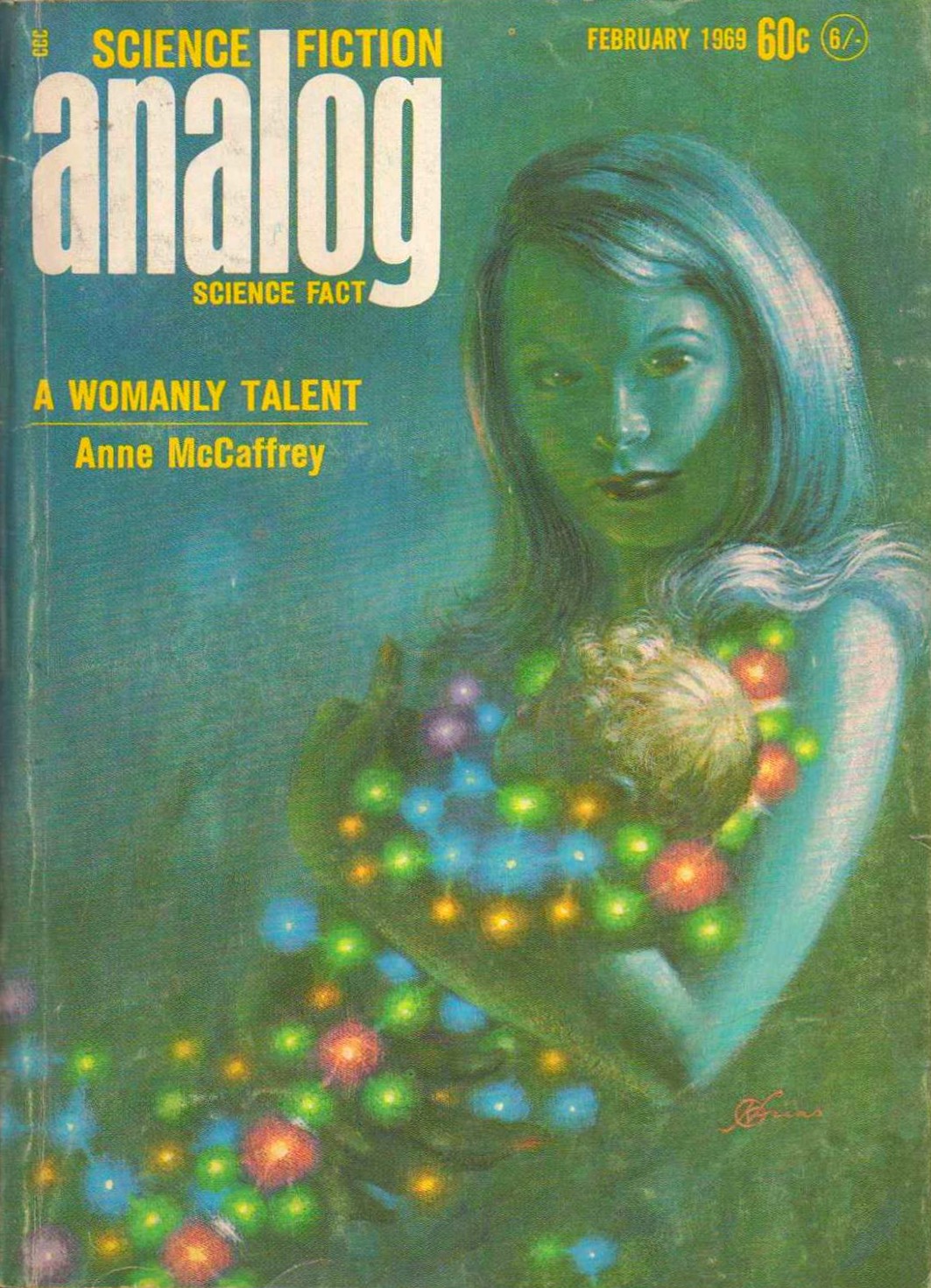 A Womanly Talent, by Anne McCaffrey
A Womanly Talent, by Anne McCaffrey
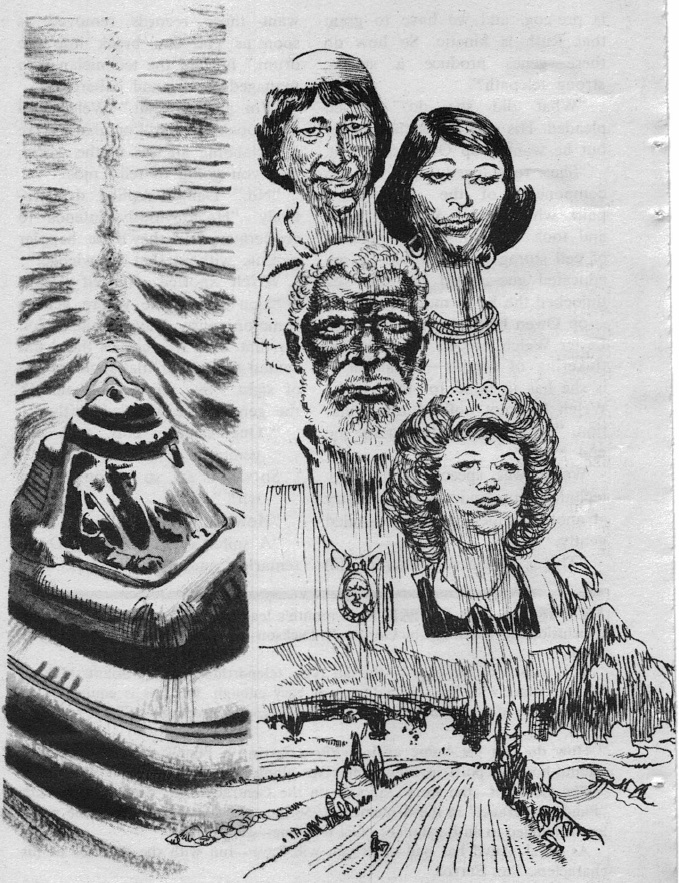

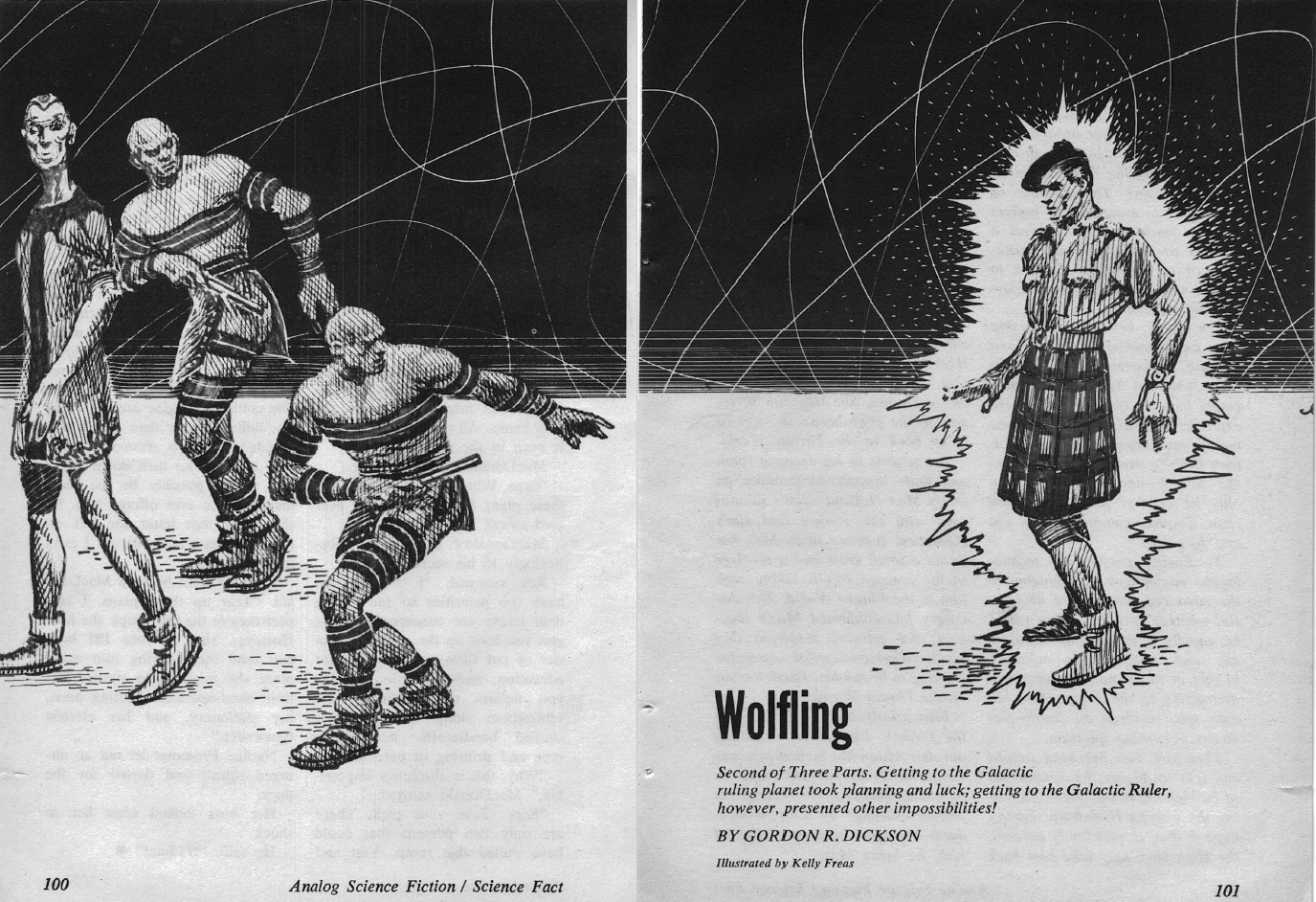
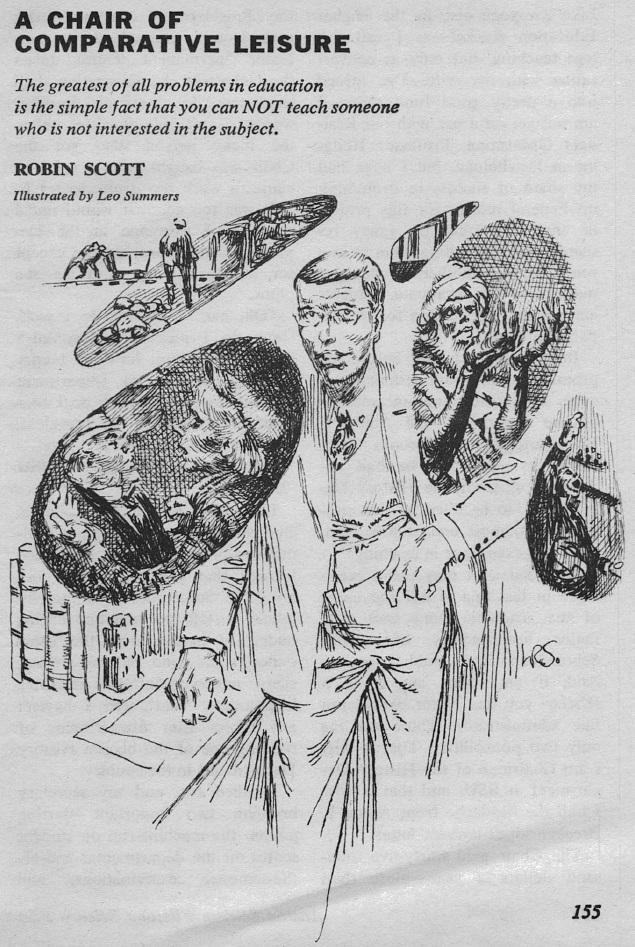

![[January 26, 1969] A New World Order <i>New Worlds</i>, February 1969](https://galacticjourney.org/wp-content/uploads/2024/01/New-Worlds-Feb-1969-672x372.jpg)
 Impressively startling cover by Gabi Nasemann.
Impressively startling cover by Gabi Nasemann. As expected, the usual nudity, not entirely related to the prose. Artwork by Gabi Nasemann.
As expected, the usual nudity, not entirely related to the prose. Artwork by Gabi Nasemann.
 Artwork by Gabi Nasemann.
Artwork by Gabi Nasemann.
 Table made up by J. G. comparing different writers. Notice the positioning of Pohl and Asimov and that of Burroughs (presumably William S., not Edgar Rice!), a sign of where this magazine seems to be going.
Table made up by J. G. comparing different writers. Notice the positioning of Pohl and Asimov and that of Burroughs (presumably William S., not Edgar Rice!), a sign of where this magazine seems to be going. Artwork by Haberfield.
Artwork by Haberfield. Artwork by John T. Sladek.
Artwork by John T. Sladek.
 Work by Mervyn Peake.
Work by Mervyn Peake. Artwork by Prigann.
Artwork by Prigann. Artwork by Prigann.
Artwork by Prigann.
 Artwork by Gabi Nasemann and Charles Platt.
Artwork by Gabi Nasemann and Charles Platt.
 An advertisement from this issue of Peake's better-known work.
An advertisement from this issue of Peake's better-known work.

![[January 18, 1969] (February 1969 <i>Fantasy and Science Fiction</i>)](https://galacticjourney.org/wp-content/uploads/2024/01/690118cover-663x372.jpg)






![[January 8, 1969] Young Punks and Old Fogies (February 1969 <i>Fantastic</i>)](https://galacticjourney.org/wp-content/uploads/2024/01/690108cover-672x372.jpg)

